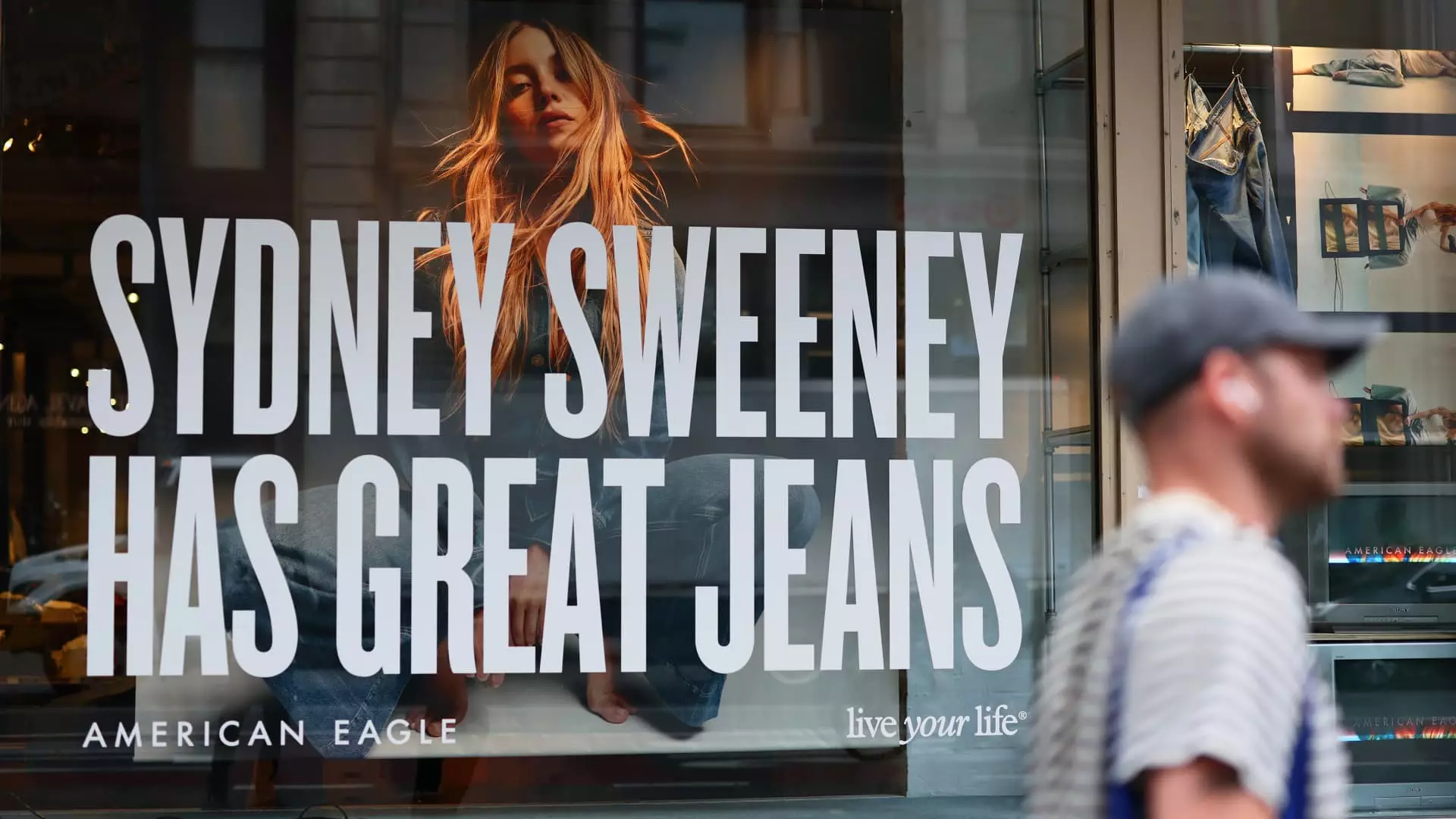In an era where consumer sentiment is increasingly polarized, brands find themselves caught in a relentless ideological tug-of-war. American Eagle’s recent foray into celebrity-driven marketing, featuring actress Sydney Sweeney, exemplifies this dynamic perfectly. The company’s decision to spotlight Sweeney, accompanied by a slogan proclaiming “Sydney Sweeney has great jeans,” was intended to boost brand visibility amid a slump in sales. Instead, it became a lightning rod for broader cultural debates, illustrating how corporate messaging no longer exists in a vacuum but is subject to the scrutiny of an ideologically divided public.
This marketing gamble underscores a disturbing trend—corporate campaigns are no longer judged solely on their quality or appeal but are now weaponized within ideological battlegrounds. While some admire a conservative-leaning portrayal that aligns with traditional values, others see it as dismissive and tone-deaf in a society striving for inclusivity. American Eagle, perhaps naïvely, assumed that a straightforward slogan focused on jeans would attract customers. Yet, the backlash that followed revealed a more insidious reality: culture war narratives tend to dominate brand perception, often overshadowing genuine product quality or innovation.
This phenomenon highlights a worrying erosion of authenticity. Instead of leveraging genuine connections with consumers, brands often resort to superficial marketing gestures disguised as bold statements. The result is a landscape where marketing becomes a reactive tool—quick to defend, quick to distance itself, often inconsistent—and ultimately, less effective at fostering loyalty. The American Eagle episode reveals how even a seemingly harmless campaign can spiral into controversy, magnified by social media echo chambers and partisan polarization.
The Power of Social Media and the Illusion of Influence
The role of social media in shaping this narrative cannot be overstated. President Donald Trump’s spontaneous endorsement via Truth Social, calling Sweeney’s ad the “HOTTEST” out there, dramatically amplified the campaign’s reach. The stock of American Eagle jumped in response, demonstrating how fragile and unpredictable market reactions are when influenced by viral moments. But this sudden surge raises critical questions about the sustainability and genuine impact of such fleeting attention.
These moments of virality often produce a false sense of success—an illusionary victory—yet rarely translate into long-term growth. American Eagle’s shares have been struggling all year, with recent declines reflecting deeper issues like macroeconomic headwinds, waning consumer confidence, and inventory missteps. The brief boost caused by Trump’s endorsement sees it as a band-aid—an opportunistic spike rather than a meaningful turnaround. Merely riding the wave of social media hype is ultimately a shortsighted approach that distracts from addressing fundamental strategic flaws.
Moreover, the perilous game of aligning marketing with volatile political sentiments can backfire. While appealing to one side might momentarily boost attention, it risks alienating a broader audience. Corporate authenticity is increasingly measured not by slogans or celebrity endorsements but by consistent, values-driven actions. American Eagle’s silence about the controversy—claiming the slogan was about jeans—underscores the hollowness of surface-level defenses when deeper cultural issues are at stake. Such guarded responses risk feeding the perception that brands are more engaged in political theater than actual customer engagement.
Market Realities and the Myth of Cultural Power
Behind the spectacle, American Eagle’s core challenges remain tangible: sluggish sales, volatile macroeconomic conditions, and shifting consumer preferences. The company’s decision to lean heavily on a trendy celebrity and provocative slogans is yet another gamble amid these difficulties. The hope was that celebrity appeal, combined with political endorsements, would spark renewed interest. However, the core problem persists—there is no quick fix for declining sales fueled by broader economic uncertainties.
The truth is, brands seeking growth must look beyond fleeting social media moments and superficial political alignments. The real power lies in authenticity, product quality, and a genuine understanding of consumer needs. American Eagle must recognize that the superficial allure of viral campaigns and ideological victories are fleeting illusions that often distract from essential strategic corrections. Consumer trust is built through consistency and integrity—qualities that cannot be manufactured through celebrity endorsements or divisive slogans.
What this episode reveals is that while the culture wars may energize certain segments momentarily, they do little to foster sustainable growth. Companies that chase after quick viral wins risk watering down their brand’s core identity, leading to long-term damage that far eclipses any short-term gains. In an era where economic headwinds loom large, and consumer confidence is fragile, authenticity must be prioritized over political theatrics or superficial popularity contests. Real progress comes not from capturing headlines but from understanding the nuance of what consumers truly value—support, quality, and a brand that resonates beyond divisive rhetoric.

